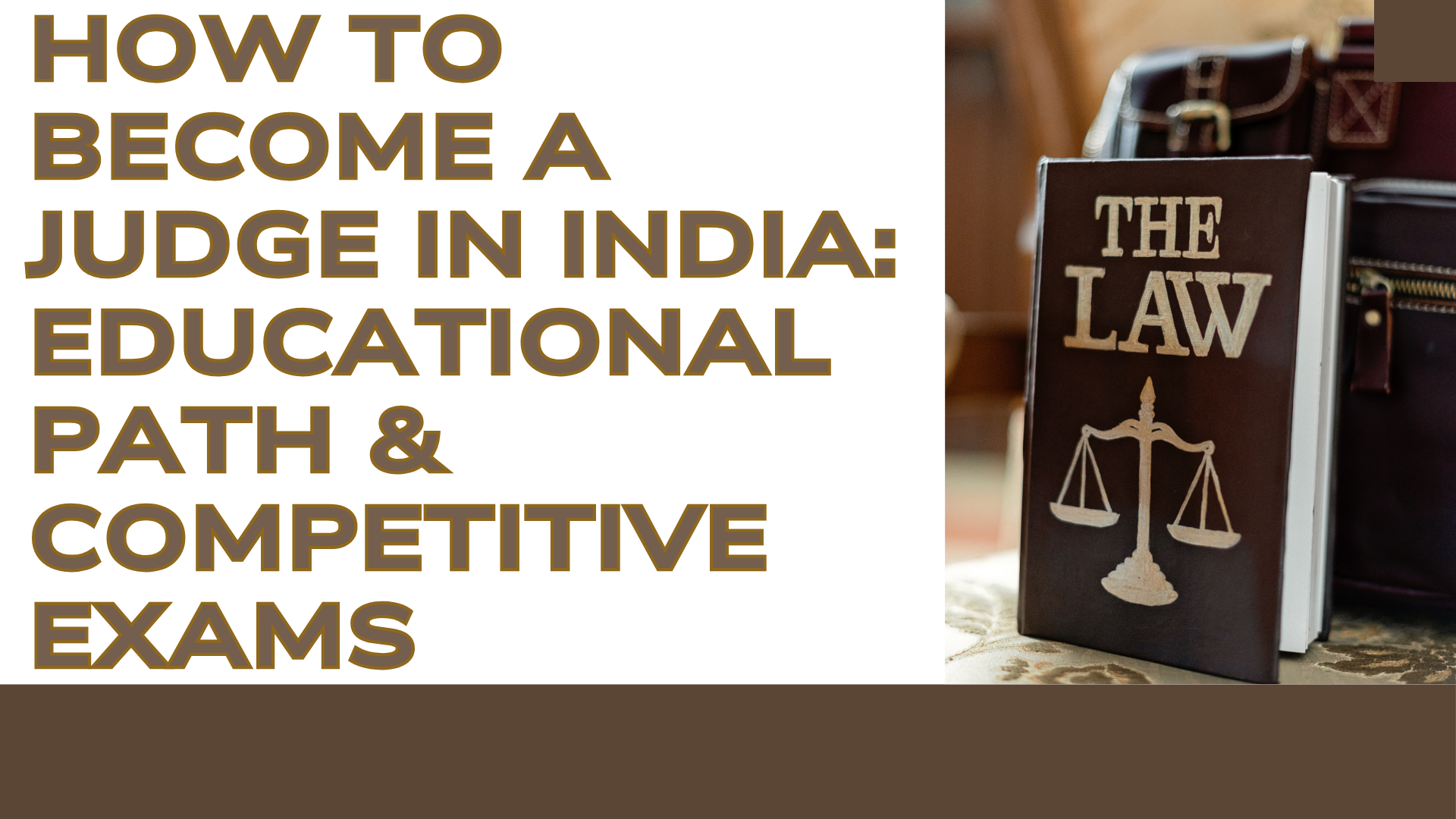In this article, we have a detailed discussion on How to Become a Judge in India: Educational Path & Competitive Exams, we hope the information here will be useful for you.
How to Become a Judge in India: Educational Path & Competitive Exams
For many prospective legal professionals, becoming a judge in India is their ideal job. The judiciary offers one of the most rewarding positions in public service because of its power, respect, and duty to protect the Constitution. However, becoming a judge requires a rigorous educational program, careful planning, and passing competitive tests.
With a focus on the educational path, competitive exams, career scope, and answers to commonly asked questions, this guide describes how to become a judge in India.
Types of Judges in India
It’s critical to comprehend the different kinds of judges in the Indian legal system before delving into the requirements:

- Judicial Magistrate or Civil Judge (Junior Division): Manages criminal or civil cases at the trial stage.
- District Judge/Additional District Judge: A judge of the district court at a higher level.
- Judges of the High Court and Supreme Court: Selected by the President of India following a significant amount of legal experience or through a promotion from a lower court.
More Details: Get Here
Educational Path & Competitive Exams
A rigorous academic and exam-based path must be followed in order to become a judge in India, depending on the level of the judiciary you want to reach:
Step 1: First, earn a law degree (LLB).
Eligibility:
Following Class 12, a five-year integrated law course (such as BA LLB or BBA LLB)
After graduation, three years of LLB in any field
Recognition: The Bar Council of India (BCI) must approve the degree.
Step 2: Join the State Bar Council
To obtain a law practice license after earning your LLB, register with your state bar council. Even if you want to join the judiciary but have no prior litigation experience, you must take this step.
Step 3: Get Ready for Competitive Court Examinations
Judicial service exams come in two primary varieties:
A. Civil Judge/Junior Division, Lower Judiciary
- Eligibility: LLB graduates are eligible (practice is not always required).
- Age restriction: 21–35 years old (varies by state)
- Structure of the Exam:
- Prelims: Objective-style multiple-choice questions for the preliminary exam
- Mains: Essays, judgment writing, and subjective legal papers
- Interview: Evaluation of personality and legal aptitude
- Tests to Keep an Eye on:
- UP PCS-J
- The Judicial Services of Delhi (DJS)
- MP Judiciary Examination
- The Rajasthan Judiciary Exam
B. Entry to the Higher Judiciary (District Judge)
- Eligibility: at least seven years of experience in litigation
- State High Courts are in charge of conducting
- Name: Extra District & Sessions Judge
- Exam Format: Written examination with viva-voce
Skills Required to Become a Judge
These are the important skills to get appointed as a Judge in the Indian judicial system:
- Solid understanding of procedural and constitutional law
- Outstanding interpreting and reasoning abilities
- Fairness and moral rectitude
- Superb written communication
- Patience and the capacity to manage intricate disputes
Salary of Judges in India (2025)
Look at the table below and get acquainted with the Salary structure of judges at different tiers:
| Judicial Role | Approx. Salary (Per Month) |
|---|---|
| Civil Judge (Entry-level) | ₹77,000–₹90,000 |
| District Judge | ₹1.4–1.8 Lakhs |
| High Court Judge | ₹2.25 Lakhs + perks |
| Supreme Court Judge | ₹2.5 Lakhs + perks |
Judges are promoted based on seniority and merit:
- Civil Judge → Senior Civil Judge → District Judge → High Court Judge → Supreme Court Judge
Some High Court and Supreme Court judges are directly elevated from the Bar.
FAQs on Becoming a Judge in India
Q1: Can I become a judge right after LLB?
A: Yes, if you qualify the PCS-J exam (Judicial Service Exam), you can become a judge without legal practice in most states.
Q2: Is coaching necessary for judiciary exams?
A: While not mandatory, many aspirants benefit from coaching for exam strategy, answer writing, and law revisions.
Q3: What is the age limit for judicial exams?
A: Typically 21–35 years for lower judiciary exams; age limits may vary across states and categories.
Q4: What are the main test subjects in judiciary exams?
A: Indian Penal Code (IPC), Civil Procedure Code (CPC), Criminal Procedure Code (CrPC), Constitution, Contract Act, Evidence Act, and general knowledge.
Q5: Can I become a judge without practicing law?
A: Yes, for lower judiciary. But for higher judiciary, 7 years of legal practice is mandatory.
Conclusion
To become a judge in India, one must have a solid legal background, prepare for exams strategically, and have a strong commitment to justice. There are distinct educational and exam pathways available, regardless of your level of experience as a lawyer hoping to advance in the judiciary. Your path to the bench begins with knowledge and integrity, so get started early, study wisely, and respect the law.
Thanks a lot for staying on this article till the end.





